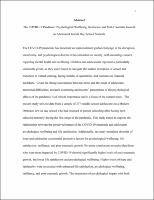Please use this identifier to cite or link to this item:
https://hdl.handle.net/20.500.12202/8194| Title: | The COVID-19 Pandemic: Psychological Wellbeing, Resilience and Post-Traumatic Growth in Adolescent Jewish Day School Students |
| Authors: | Pelcovitz, David Novick, Rona Schiffman, Mordechai Solowiejczyk-Namdar, Carly |
| Keywords: | Developmental psychology Psychology Education adolescence COVID Jewish post-traumatic growth resilience wellbeing |
| Issue Date: | Jan-2022 |
| Publisher: | ProQuest Dissertations & Theses Global |
| Citation: | Namdar, C.S. (2022, January). The COVID-19 Pandemic: Psychological Wellbeing, Resilience and Post-Traumatic Growth in Adolescent Jewish Day School Students (Publication No. 29212713) [Doctoral Dissertation, Yeshiva University]. ProQuest Dissertations & Theses Global. |
| Series/Report no.: | ProQuest Dissertations & Theses Global;Publication No. 29212713 |
| Abstract: | The COVID-19 pandemic has presented an unprecedented global challenge in the disruption, uncertainty, and psychological distress it has unleashed on society, with mounting concern regarding mental health and wellbeing. Children and adolescents represent a particularly vulnerable group, as they were forced to navigate the sudden disruption of school and transition to virtual learning, facing months of quarantine, and increases in financial hardships. Given the strong associations between stress and the onset of adolescent emotional difficulties, research examining adolescents’ perceptions of the psychological effects of the pandemic is of critical importance and is a focus of the current study. The present study utilized data from a sample of 277 middle-school adolescents in a Modern Orthodox Jewish day school who had resumed in-person schooling after having been schooled remotely during the first surge of the pandemic. This study aimed to explore the relationship between the perceived impact of the COVID-19 pandemic and adolescent psychological wellbeing and life satisfaction. Additionally, the study examined the roles of hope and spirituality as potential protective factors for psychological wellbeing, life satisfaction, resilience, and post-traumatic growth. Bivariate correlations revealed that those who were more impacted by COVID-19 showed significantly higher levels of post-traumatic growth, but lower life satisfaction and psychological wellbeing. Higher levels of hope and spirituality were associated with enhanced life satisfaction, psychological wellbeing, resilience, and post-traumatic growth. The interaction of psychological impact with both hope and spirituality on resilience was also significant, but post-hoc analyses did not follow predicted patterns. Psychological impact tended to be more negatively related to resilience when students had higher levels of hope and spirituality. The current study presented a unique research opportunity to gain insight into the perceived impact of the pandemic on adolescents in Jewish day schools and examine the role of hope and spirituality in relation to adolescent adjustment. The study’s findings suggest a need to monitor adolescent mental health closely in the wake of the pandemic and introduce and integrate appropriate interventions within education to support and strengthen adolescent wellbeing and promote thriving. |
| Description: | Doctoral dissertation, EdD / OA |
| URI: | https://hdl.handle.net/20.500.12202/8194 https://ezproxy.yu.edu/login?url=https://www.proquest.com/dissertations-theses/covid-19-pandemic-psychological-wellbeing/docview/2676608379/se-2?accountid=15178 |
| Appears in Collections: | Azrieli Graduate School of Jewish Education & Administration: Doctoral Dissertations |
Files in This Item:
| File | Description | Size | Format | |
|---|---|---|---|---|
| Namdar May 2022 OA COVID-19 Pandemic R.pdf | 856.51 kB | Adobe PDF |  View/Open |
This item is licensed under a Creative Commons License

